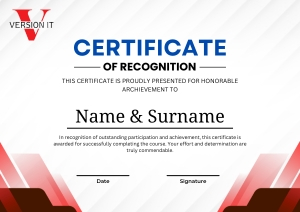Home > Courses > Popular Courses > GCP Data Engineer Course
GCP Data Engineer Training in Bangalore
Best GCP Data Engineer Training in Bangalore
Version IT provides a GCP Data Engineer program in Bangalore. The course enables learners and business individuals to comprehend the process of scaling, optimizing and managing data pipelines in Google Cloud Platform. Students can pass the Google Professional Data Engineer exam through practical laboratory work, real-world project assignments, and professional instruction.
12 Modules
with Certifications
Certificate
After Completion
English
Language
The program is perfect among fresh graduates, computer scientists, and data lovers aiming to have a career in cloud-based data engineering. Participants will be taught to ingest process, store and perform advanced analytics on Google Cloud, which will equip them with a competitive edge in the Calgary and wider IT employment sector.
Why to Take GCP Data Engineer Training in Bangalore?
Bangalore is the biggest IT center in India, commonly referred to as the Silicon Valley of India. With the expansion of cloud integration, the number of GCP-certified data engineers is on the increase. By enrolling, you receive:
- Expert trainers who have experience in GCP over the years.
- A curriculum based on Google Cloud certification.
- Live banking, healthcare, retail case studies and more.
- Career guidance and placement support to Bangalore’s IT market.
- Various schedules: classroom, online and weekend classes.
Being one of the most comprehensive GCP Data Engineer courses in Bangalore, our program offers an opportunity to those who want to develop their careers.
What is GCP Data Engineering?
GCP Data engineering is the process of designing and creating systems that process, structure and analyze large volumes of data on Google cloud. Data engineers deal with the following activities:
- Consuming more than one source of data.
- Data cleaning and data transformation.
- Machine learning and reporting preparation datasets.
Key skills include:
- Developing scalable data pipelines.
- Services GCP, such as BigQuery, Bigtable, Pub/Sub and Dataflow.
- Data storage solution management.
- Training machine learning models using BigQuery ML.
- Procuring and optimizing cloud data infrastructure.
These competencies allow organizations to make real time and data-driven decisions.
Overview of GCP Data Engineer Course Curriculum
All of the fundamental concepts, tools, and project scenarios are taught in our GCP Data Engineer Training in Bangalore. The curriculum is also updated often to keep in line with Google Cloud certification trends and industry requirements.
Module 1: Introduction to Cloud and GCP * Basics of cloud computing * GCP platform overview * Setting up a GCP environment | Module 2: Data Storage in GCP * Google Cloud Storage * Cloud SQL and Cloud Spanner * Introduction to Bigtable and BigQuery |
Module 3: Data Ingestion and Processing * Pub/Sub fundamentals * Batch and stream processing dataflow pipelines. * Dataproc Hadoop and Spark workloads | Module 4: BigQuery Advanced Analytics * Partitioning and BigQuery architecture. * SQL query writing and optimization. * Implementing BigQuery ML |
Module 5: Data Orchestration and Workflow Automation * Cloud Composer basics * Workflow scheduling and management | Module 6: Security and Compliance. Management of IAM roles and permissions * Data encryption techniques * GCP compliance best practices. |
Module 7: Integrating machine learning and AI * TensorFlow on GCP * AI Platform basics * ML pipeline development (end-to-end) | Module 8: Existence Industry Projects * Creating an online real-time data piping using Pub/Sub and Dataflow. Achieving data warehousing modernization with BigQuery. * Implementation of machine learning models. |
Who Can Join This Course?
The program suits:
- New graduates who want to pursue cloud data positions.
- Database administrators and data analysts seeking to up skill.
- Cloud technologies: software engineers who desire to relocate.
- IT people are training to take the Google Professional Data Engineer exam.
- Engineers planning to focus on GCP with big-data, in particular.
Career Opportunities after GCP Data Engineer Training
GCP Data Engineer certification is the key to numerous well-paid jobs. Following the course, you may pursue such jobs as:
- GCP Data Engineer
- Cloud Data Analyst
- Big Data Engineer
- Business Intelligence Engineer.
- Machine learning engineer (GCP ML)
The leading MNCs and startups in Bangalore Google, Accenture, Infosys, Wipro, and Flipkart all aggressively hire GCP-certified talent.
Key Benefits of Joining GCP Data Engineer Course at Version IT
The Major Advantages of Our GCP Data engineer Course.
- Certification Preparation
- Placement Support
- Flexible Learning
- Practical Focus
- Industry Projects
- Competitive Costs
GCP Data Engineer Training Modes Available
Below are the learning formats that we have to offer you:
Classroom Training | Online Training | Weekend Batches |
About the GCP Data Engineer Trainer
Our trainers are experienced GCP professionals who have a strong background in data engineering and cloud consultancy. They introduce actual project experience to the classes so that students can use concepts on real-life business issues.
Placement Assistance
Our placement cell assists you with:
- Maximize the resume with GCP-related keywords.
- One-on-one interviews are structured on pre-interview preparation.
- Mock technical tests
- IT job notices in Bangalore by partner firms.
Why Version IT for GCP Data Engineer Online Training?
Version IT is a reliable training institute in Bangalore due to:
- Professional GCP-qualified instructors.
- Individualized, modernized curriculum.
- Project-based, practical learning.
- Comfortable prices with convenient payment alternatives.
- 100 % placement assistance
Enroll Today & Start Your Journey toward Becoming A Certified GCP Data Engineer
Topics You will Learn
Designing data processing systems
Designing flexible data representations. Considerations include:
- future advances in data technology
- changes to business requirements
- awareness of current state and how to migrate the design to a future state
- data modeling
- tradeoffs
- distributed systems
- schema design
Designing data pipelines. Considerations include:
- future advances in data technology
- changes to business requirements
- awareness of current state and how to migrate the design to a future state
- data modeling
- tradeoffs
- system availability
- distributed systems
- schema design
- common sources of error (eg. removing selection bias
Designing data processing infrastructure. Considerations include:
- future advances in data technology
- changes to business requirements
- awareness of current state, how to migrate the design to the future state
- data modeling
- tradeoffs
- system availability
- distributed systems
- schema design
- capacity planning
- different types of architectures: message brokers, message queues, middleware, serviceoriented
Building and maintaining data structures and databases
Building and maintaining flexible data representations
Building and maintaining pipelines. Considerations include:
- data cleansing
- batch and streaming
- transformation
- acquire and import data
- testing and quality control
- Connecting to new data sources
Building and maintaining processing infrastructure. Considerations include:
- provisioning resources
- monitoring pipelines
- adjusting pipelines
- testing and quality control
Analyzing data and enabling machine learning
Analyzing data. Considerations include:
- data collection and labeling
- data visualization
- dimensionality reduction
- data cleaning/normalization
- defining success metrics
Machine learning. Considerations include:
- feature selection/engineering
- algorithm selection
- debugging a model
Machine learning model deployment. Considerations include:
- performance/cost optimization
- online/dynamic learning
Ensuring reliability
Performing quality control. Considerations include:
- verification
- building and running test suites
- pipeline monitoring
Assessing, troubleshooting, and improving data representations and data processing
infrastructure.
Recovering data. Considerations include:
- planning (e.g. fault-tolerance)
- executing (e.g., rerunning failed jobs, performing retrospective re-analysis)
- stress testing data recovery plans and processes
Data Structures or Collections
- Applications of Data structures
- Types of Collections
- Sequence
- Strings, List, Tuple, range
- Non sequence
- Set, Frozen set, Dictionary
- Strings
- What is string
- Representation of Strings
- Processing elements using indexing
- Processing elements using Iterators
- Manipulation of String using Indexing and Slicing
- String operators
- Methods of String object
- String Formatting
- String functions
- String Immutability
- Case studies
Tuple Collection
- What is tuple?
- Different ways of creating Tuple
- Method of Tuple object
- Tuple is Immutable
- Mutable and Immutable elements of Tuple
- Process tuple through Indexing and Slicing
- List v/s Tuple
Visualizing data and advocating policy
- Building (or selecting) data visualization and reporting tools. Considerations include:
automation - decision support
- data summarization, (e.g, translation up the chain, fidelity, trackability, integrity)
Advocating policies and publishing data and reports.
Designing for security and compliance
Designing secure data infrastructure and processes. Considerations include:
- Identity and Access Management (IAM)
- data security
- penetration testing
- Separation of Duties (SoD)
- security control
- Designing for legal compliance. Considerations include:
legislation (e.g., Health Insurance Portability and Accountability Act (HIPAA), Children’s
Online Privacy Protection Act (COPPA), etc.) - audits
Operators
- Arithmetic Operators
- Comparison Operators
- Python Assignment Operators
- Logical Operators
- Bitwise Operators
- Shift operators
- Membership Operators
- Identity Operators
- Ternary Operator
- Operator precedence
- Difference between “is” vs “==”
Control Statements
- Conditional control statements
- If
- If-else
- If-elif-else
- Nested-if
- Loop control statements
- for
- while
- Nested loops
- Branching statements
- Break
- Continue
- Pass
- Return
- Case studies
List Collection
- What is List
- Need of List collection
- Different ways of creating List
- List comprehension
- List indices
- Processing elements of List through Indexing and Slicing
- List object methods
- List is Mutable
- Mutable and Immutable elements of List
- Nested Lists
- List_of_lists
- Hardcopy, shallowCopy and DeepCopy
- zip() in Python
- How to unzip?
- Python Arrays:
- Case studies
Set Collection
- What is set?
- Different ways of creating set
- Difference between list and set
- Iteration Over Sets
- Accessing elements of set
- Python Set Methods
- Python Set Operations
- Union of sets
- functions and methods of set
- Python Frozen set
- Difference between set and frozenset ?
- Case study
Let Your Certificates Speak

- Comprehensive training in GCP Data Engineer.
- Certificates are globally recognized & they upgrade your programming profile.
- Certificates are generated after the completion of course.
All You Need to Start this Course
- Basic understanding of data concepts, SQL, and programming languages like Python.
- Familiarity with cloud computing concepts and prior experience with any cloud platform would be beneficial but not mandatory.
Testimonials




Still Having Doubts?
The course will take 8 or 10 weeks which will include both theory and practical projects. Batches can be done on weekends and weekdays to suit the various schedules.
No previous knowledge of the clouds is needed. Simple knowledge of databases, SQL or programming is a beneficial plus.
Yes. Our program is based on the official certification syllabus and it covers exam-practical test topics and advice to pass the exam without fear.
Upon completion, you would get a job position as GCP Data Engineer, Big Data Engineer, Cloud Data Analyst, and BI Engineer in the leading companies, Bangalore and other IT hubs, are available.
We provide complete placement services: resume creation, practice interviews, and job referrals via our network partners to help you find job opportunities.


